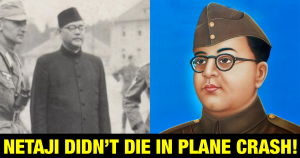
French Secret Report Confirms ‘Netaji Didn’t Die In Plane Crash’, Submits Report To Indian Govt
Founder of Indian National Army and an eminent personality, admired for his exemplary efforts in bagging Independence, Netaji Subhas Chandra Bose, left his impressions on Indian history inspiring millions to fight for the Mother India’s Independence.
And what all he has done to break the shackles of Imperialism is quite beyond words. The sudden assumed demise of Netaji has left the whole country in depression. With the plane crash that took place in Taiwan, it is assumed that Netaji is dead. However, in a bid to unleash the speculations saying that he’s alive, Govt of India has gone forward with three commissions -The Shah Nawaz Committee (1956) and Khosla Commission (1970) said that Bose died in an air crash on August 18, 1945, at Taihoku airport in Japanese-occupied Taipei, while the Mukherjee Commission (1999) concluded that he did not die in an air-crash.
With these diverse opinions, from the subsequent commissions, the government, however, rejected the findings of the Mukherjee Commission. But that didn’t stop scholars from dwelling deep to find the truth further.
On the other hand, J B P More, a Paris-based historian, who recently stumbled upon a brief French secret service report dated December 11, 1947, at the National Archives of France, has come up with a finding that Bose didn’t die in an air crash and was still alive during 1947. He added that Netaji lived for long after the assumed demise day.
“It is not stated in the document that Subhas Chandra Bose died in the air crash in Taiwan. Instead, it is reported that Bose’s present whereabouts were unknown as late as December 1947, which again implies that the French did not buy not buy the theory that Bose died in the air-crash on August 18, 1945,” said More, who teaches at the Institut des Hautes Etudes Economiques et Commerciales, Paris’ prominent university.
He then said that Bose escaped the accident and his whereabouts post that are not yet known, in his words: “But he escaped from Indochina alive and his whereabouts were unknown as late as December 11, 1947, as reported in the secret document. This implies that he was alive somewhere but not dead in 1947.” These words said by him were quoted on “Haut Commissariat de France for Indochina” SDECE Indochinese Base BCRI No.41283 csah Ex No. 616, under the title: “Archival Information on Subhas Chandra Bose.”
It then added, “In this report, it is clearly stated that he was the ex-chief of the Indian Independence League and a member of Hikari Kikan, a Japanese organization, he escaped from Indochina, though it does not state how.”
Going back to the beginning of the interrogation, earlier, back then, the British and the Japanese declared that Bose died in an air crash after he took off from Saigon on his way to Tokyo. And contrary to the former countries, the French government who colonized the Vietnam and Indochina during the 1940s remained calm on the same.
The presence of French Govt in the Indo-China, now, cemented the significance of More’s findings. “Very quickly after the Japanese debacle and surrender on 15th August 1945, the French arrived in Saigon, along with British troops and took charge of Saigon. But unfortunately, they left no direct accounts of Bose’s death in the air crash. They had never endorsed the theory that Bose died in the crash,” concluded More in his report.